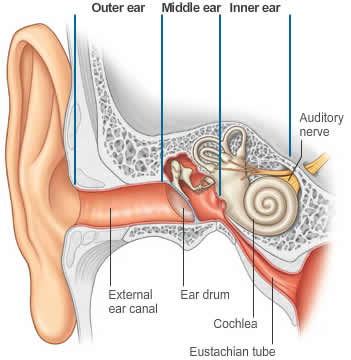How Does Hearing Loss Due To Stroke Occur?
Actually, many times stroke survivors don’t have any problem with their ability for hearing sound around them. In other words, they often know what they hear, but their brain cannot work optimally to process the information optimally. However, there is a chance for hearing loss to occur – especially for survivors with stroke that affects their brain stem or/and left-brain.
It can occur gradually as you age or even suddenly. It can be only temporary /permanent -or- mild /severe, depending on the cause that triggers the problem. When it occurs gradually, typically patients can be aware that there is a problem and they can immediately take appropriate treatment to improve the problem.
Hearing loss can occur due to several reasons.
These can include (a) when your ear doesn’t respond what you hear and (b) when the parts of the brain that have crucial functions to control the major nerves for hearing cannot work as well they should. In few cases, both causes can occur together at the same time.
Each of your ears has special sensitive hair cells. They can be found inside the spiral tube of your inner ear, particularly inside a part of the ear called cochlea.
The way of these hair cells work can decreases as you get older. When they doesn’t work optimally or even die, the mechanism of your hearing can be significantly affected. Therefore, age is an unchangeable risk factor for hearing loss.
According to Health Wise, loud noise is another common cause. If you get repeated exposure to loud noise, over time it can significantly affect your hearing.
Loud noise can affect people of all ages, particularly for those who:
- Work in nightclub or any area where there is too loud music.
- Work with noisy machines or equipment.
- Often listen to music at very high volume. Typically, this occurs when you listen to a song through headphones.
However, some health conditions that affect the blood flow to parts of the brain that control the mechanism of your hearing – or health problems that affect the inner ear can be potential to cause a hearing loss.
These health conditions may include hypertension (high blood pressure), chronic high blood sugar (common in people with diabetes – both type-1 and type-2 diabetes), heart disease, and stroke.
* Picture credit to NHS.uk
Many times, stroke is often associated with skills lost that affect one side of the body ‘left or right’.
When the brain-left is affected, typically it causes physical problems that affect the right side of the body. On the other hand, if the blocked blood flow occurs in the right-brain, it usually affects the left side of the body.
Brain-left stroke is not directly linked with hearing loss. But survivors with it often experience difficulty speaking and language. Those with aphasia (a condition that can cause a language skill lost – and it is pretty common in people with left-brain stroke) can experience difficulty in language-receiver.
 In many cases, it’s difficult to communicate with people with aphasia. Many times, there is no problem with the health of their hearing. They are often able to hear what you say, but it’s difficult for them to understand each sentence that you say.
In many cases, it’s difficult to communicate with people with aphasia. Many times, there is no problem with the health of their hearing. They are often able to hear what you say, but it’s difficult for them to understand each sentence that you say.
Furthermore, they are very poor to arrange a sentence that contains more than one word. They often cannot say what they want to say properly.
So, though people with aphasia due to stroke have good hearing, the communication with people with aphasia is often difficult for both sides.
In addition, stroke survivors with right-brain damage may also experience problems with language and speech. But the problems are often mild or usually less severe than those with left-brain damage.
When it comes to the issue of hearing loss and stroke, brain-stem stroke is the most reasonable answer.




